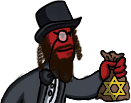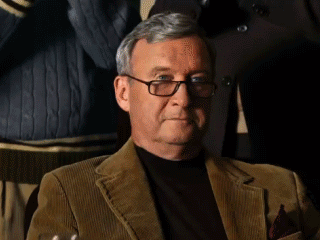- Joined
- Jan 28, 2011
- Messages
- 99,616















Tags: Colin McComb; InXile Entertainment; Planescape: Torment; PSX Planescape game; Torment: Tides of Numenera; TORN
There's a nice new interview with Colin McComb over at Russian RPG site RPGNuke, in which he answers questions about Torment, about his career and the games he's worked on, and about his thoughts on gaming in general. Here's the part about Torment:
The rest of the interview is interesting too, though. I didn't know Colin was an Ultima guy.
There's a nice new interview with Colin McComb over at Russian RPG site RPGNuke, in which he answers questions about Torment, about his career and the games he's worked on, and about his thoughts on gaming in general. Here's the part about Torment:
RPGNuke: Hi Colin! Let's start with some Tides of Numenera questions. A one and a half years passed since the end of kickstarter campaign. What is the status of the project now? Where there many changes to the initially planned? Did you have to cut anything out or did you manage to add anything new? As far as I know the pre-production phase now comes to its end and the prodution phase starts, how does this transition occur?
Colin: We are shifting from limited production to production. What limited production means is that we were creating content for the game, but not at the speed that we might expect during a full production period. Rather, it’s in ways that prove out our ideas and concepts, or that show where the weaknesses in our pipeline are, or that help build the best processes for the whole team.
As to whether we had to cut anything: We have! But that’s natural for any project as we assess scope and our desired impact. We’ve tightened up the story in some places, expanded it in others, and tried to make sure that we are focused exactly on delivering what we’ve promised to our backers. We’ve also managed to expand areas that were smaller in the original vision, and I’m happy with where we are as a result of our discussions.
The transition from Wasteland 2 to Torment is happening slowly and carefully under Kevin’s supervision. He wants to make sure that the newer members of the team are done with their responsibilities on Wasteland 2, or at least done enough that they can begin to devote serious attention to our project. They’ll start by getting familiar with our tools and our processes, and they can point out places where our processes and documentation need improvement. As more and more of them come over, and as people ramp up on the project, we’ll see a faster pace for production and creation of all our assets.
New Torment will have turn-based combat system. Not everyone is happy about that, though Planescape: Torment combat system is being scolded frequently too. Please tell me, did you consider to make Planescape: Torment turn-based? Do you think this variant could be viable and what do you prefer: turn-based or realtime with pause?
With Planescape: Torment, we didn’t really have a choice, as I recall. We were working with the Infinity Engine, and we were working on delivering an experience that matched (at least in part) what Bioware had done with Baldur’s Gate. We had a much broader latitude to choose turn-based or real-time with pause for this game, but even then we had a difficult decision to make. Having backer feedback was invaluable, and even then, it was a tough decision. The more we delve into the Crisis system, the more I am convinced we made the right choice.
My personal preference for games depends on what game I’m playing. I’m not an absolutist in either direction.
Torment: Tides of Numenera's central question is "What does one life matter?", were there any other variants in concideration?
From the start, it was always about the legacy we leave from the choices we make in life. The difficulty was in finding the right words to express that question. I believe it was Nathan Long who came up with this particular phrase, and as soon as he said it, we were off.
At first glance it seems that Torment: Tides of Numenera replicates a lot of ideas from Planescape: Torment. Do you think this statement is correct?
I agree with "at first glance" and "seems". That is, it might appear that way superficially, but one could say that of any number of stories. We're intentionally focusing on an intensely personal story, as PST did (though we're talking about issues of legacy and abandonment rather than regret and growth); we're in a strange, alien world, with unusual characters for an RPG. We chose all these similarities deliberately, identifying them as key parts of the Torment experience. But we are also deliberately stepping away from a number of the things that PST did, because we don't want to replicate it. Our mission is to analyze what we loved about PST, and then to make a game that will be a worthy successor to that title, a welcome peer, and hopefully a milestone for future development.
Colin: We are shifting from limited production to production. What limited production means is that we were creating content for the game, but not at the speed that we might expect during a full production period. Rather, it’s in ways that prove out our ideas and concepts, or that show where the weaknesses in our pipeline are, or that help build the best processes for the whole team.
As to whether we had to cut anything: We have! But that’s natural for any project as we assess scope and our desired impact. We’ve tightened up the story in some places, expanded it in others, and tried to make sure that we are focused exactly on delivering what we’ve promised to our backers. We’ve also managed to expand areas that were smaller in the original vision, and I’m happy with where we are as a result of our discussions.
The transition from Wasteland 2 to Torment is happening slowly and carefully under Kevin’s supervision. He wants to make sure that the newer members of the team are done with their responsibilities on Wasteland 2, or at least done enough that they can begin to devote serious attention to our project. They’ll start by getting familiar with our tools and our processes, and they can point out places where our processes and documentation need improvement. As more and more of them come over, and as people ramp up on the project, we’ll see a faster pace for production and creation of all our assets.
New Torment will have turn-based combat system. Not everyone is happy about that, though Planescape: Torment combat system is being scolded frequently too. Please tell me, did you consider to make Planescape: Torment turn-based? Do you think this variant could be viable and what do you prefer: turn-based or realtime with pause?
With Planescape: Torment, we didn’t really have a choice, as I recall. We were working with the Infinity Engine, and we were working on delivering an experience that matched (at least in part) what Bioware had done with Baldur’s Gate. We had a much broader latitude to choose turn-based or real-time with pause for this game, but even then we had a difficult decision to make. Having backer feedback was invaluable, and even then, it was a tough decision. The more we delve into the Crisis system, the more I am convinced we made the right choice.
My personal preference for games depends on what game I’m playing. I’m not an absolutist in either direction.
Torment: Tides of Numenera's central question is "What does one life matter?", were there any other variants in concideration?
From the start, it was always about the legacy we leave from the choices we make in life. The difficulty was in finding the right words to express that question. I believe it was Nathan Long who came up with this particular phrase, and as soon as he said it, we were off.
At first glance it seems that Torment: Tides of Numenera replicates a lot of ideas from Planescape: Torment. Do you think this statement is correct?
I agree with "at first glance" and "seems". That is, it might appear that way superficially, but one could say that of any number of stories. We're intentionally focusing on an intensely personal story, as PST did (though we're talking about issues of legacy and abandonment rather than regret and growth); we're in a strange, alien world, with unusual characters for an RPG. We chose all these similarities deliberately, identifying them as key parts of the Torment experience. But we are also deliberately stepping away from a number of the things that PST did, because we don't want to replicate it. Our mission is to analyze what we loved about PST, and then to make a game that will be a worthy successor to that title, a welcome peer, and hopefully a milestone for future development.
The rest of the interview is interesting too, though. I didn't know Colin was an Ultima guy.







![Have Many Potato [2013] Codex 2013](/forums/smiles/campaign_tags/campaign_potato2013.png)
![The Year of Incline [2014] Codex 2014](/forums/smiles/campaign_tags/campaign_incline2014.png)










![Glory to Codexia! [2012] Codex 2012](/forums/smiles/campaign_tags/campaign_slushfund2012.png)














